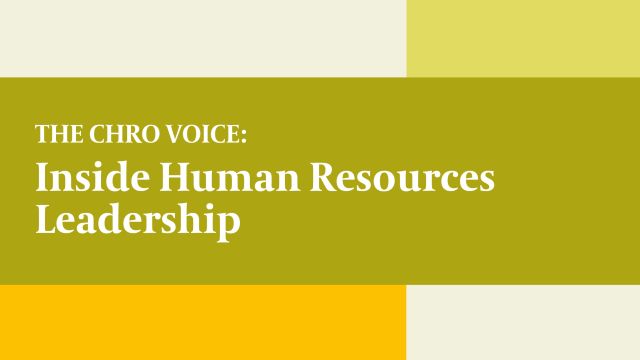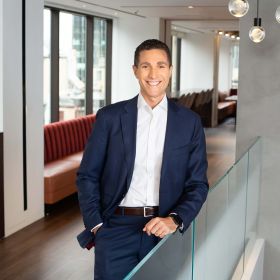Part of what I love about the work I do is all the different aspects and facets to it, and I think anybody in the CHRO role, or frankly any other HR position, has to be a business person first.
 Mary Beth DeNooyerCHRO of Keurig Dr Pepper
Mary Beth DeNooyerCHRO of Keurig Dr Pepper
While people and culture have always been important to an organization’s success, CHROs today are increasingly expected to play a more active role in shaping business strategy.
To better understand what these shifting dynamics look like, we spoke with Mary Beth DeNooyer, CHRO of Keurig Dr Pepper, who shared her thoughts and expertise on shaping the evolution of the board and C-Suite, the importance of building a network of industry peers, and how the next generation of HR leadership can maximize the value of their professional experiences.
In your role as CHRO, how do you navigate the demands to be both a driver of business strategy and leadership team dynamics while also managing your functional responsibilities?
That’s kind of the fun of the role, right? Part of what I love about the work I do is all the different aspects and facets to it, and I think anybody in the CHRO role, or frankly any other HR position, has to be a business person first.
I see myself as being a business partner who brings HR expertise, just as the CFO is a business partner who brings financial expertise. My job starts with asking the question of: What problems are we trying to solve as a business? What are the things that keep business leaders awake at night? And what HR levers need to be pushed or pulled to solve those problems?
This makes the work more exciting for me, but it’s also how I bring my HR team along, and, from the feedback I’ve received, it really motivates them. To say: here’s this problem we’re trying to solve together, here’s the lever we can use, and here’s the expertise you all bring to the table. It’s about understanding that we’re not just doing HR work for HR’s sake but to actually solve something important for the business.
Has this orientation always been a reality for you, or has the CHRO role expanded over time?
I think for the best HR people, that’s always been the expectation, but it’s certainly grown even more over the past 5 to 10 years. I think you’d be hard-pressed today to find anybody in the field who sees themselves as only a functional expert, as opposed to seeing their job in the context of what challenges the business is facing, and what opportunities exist to solve those problems from the people side of things.
Personally, I don’t know how you’d do it otherwise, and I think for me the inspiring part of the role is getting to work more closely with the board, the CEO, and the full C-Suite on an array of those critical things on their plate that have a unique people component.
What’s the most exciting part about working with the Board and C-Suite as an HR leader?
We are actually going through a Board evolution, so I am working with our Chair, CEO, and General Counsel to answer some key questions about how we want our Board to evolve. What does that evolution look like? What skills are needed as a board? How are we defining the culture of the board, and how does that align with the broader culture of the company? How do we identify and attract the right candidates for the job?
It’s a really unique opportunity to shape the culture of the company, and I’m excited to be involved in that process. At some companies the board is treated as a separate entity, but at the end of the day this is a leadership talent issue, which is why I am involved.
We are actually going through a Board evolution, so I am working with our Chair, CEO, and General Counsel to answer some key questions about how we want our Board to evolve. What does that evolution look like?
Mary Beth DeNooyerCHRO of Keurig Dr Pepper
As a CHRO who’s had the opportunity to work on a CEO succession, was there anything particularly interesting or surprising about the process?
One of the core lessons for me was that it’s not much different than sourcing for any other executive job. Just like the company wants any executive with particular strengths, we want a CEO whose skill set aligns with what we’re trying to accomplish.
So, it starts with having that same conversation with the board about our company’s strategy and the kind of expertise we need a CEO to have to support that strategy. From there, it’s the same process of looking into candidates who meet those criteria and assessing them through multiple panel interviews, individual interviews, assessments, etc. It requires a lot of time and having a best-in-class interview process, but it’s a big decision, and the board wants to make sure they get it right.
What makes it a little different from other hiring processes is a smaller pool of qualified candidates and managing the stakeholder landscape. Rather than having just one hiring manager who takes outside input into consideration, you have a lot of “hiring managers” in the form of the collective board, so it’s much more of a consensus-based process and can take longer than most people expect.
Next to the CEO, the CHRO is sometimes described as the second loneliest role in the C-Suite. Has that been your experience and, if so, how do you navigate that challenge?
It’s a bit of a paradox, because as a CHRO, you’re surrounded by people and you’re doing things with people all day and every day, which isn’t something you’d normally associate with loneliness. Most of the time I don’t feel lonely at all because I’m with people all the time and have built strong relationships. My role requires me to be looking and interacting across the enterprise, so I’m involved and participating in a lot of things, and there’s not much going on in the company that I don’t know about.
But there are also some unique aspects of the CHRO role because you’re encumbered by a lot of confidential information. For example, there are things I learn from the CEO, the GC or the CFO that I cannot share, and there can be some loneliness to that. And the other lonely component is that everybody else is often coming to you to talk about their career, their teams, their relationship with the CEO, etc. So, it can sometimes feel like you’re the sounding board for everybody else, but at the same time, you’re also human and need someone to talk to about what’s on your mind.
As the only CHRO in the company, you don’t really have someone within the organization you can turn to and ask these questions or use as that sounding board, so being able to leverage that network is essential.
Mary Beth DeNooyerCHRO of Keurig Dr Pepper
This is an issue I think all HR leaders confront at some point, and this is where having access to a network of other CHROs becomes important. I’ve been fortunate to have industry peers who I can call and say, “Here’s how I’m feeling at the moment,” or “Have you ever encountered this?” Because as the only CHRO in the company, you don’t really have someone within the organization you can turn to and ask these questions or use as that sounding board, so being able to leverage that network is essential.
I think Covid also caused all of us to open up even more than we had with each other prior. We were all in a major crisis we didn’t know how to solve, so we were talking to each other constantly. I have found the HR community to be much more willing to share and help each other following such an acute situation because we realize that we are all grappling with challenging, complex things, even if they are less acute.
What advice would you give your younger self about going into HR, and how would you advise the next generation of HR leaders?
There are two things that come to mind. The first is the importance of learning the business. Whatever organization you’re a part of and whatever your role is in HR, you need to know how the business works and what the objectives are. If it’s a for-profit company, how is the money being made? If it’s a non-profit, what is the mission and how do they measure success? Either way, knowing and remaining curious about what drives the organization forward allows you to play a bigger role in its success, and this kind of learning is something I think too often comes later in an HR leader’s career.
When you’re asked to do different things, you’ll start asking that question of, “Is what I’m doing or how I’m approaching this adding something to my toolbox that will make me a better general contractor later on?”
Mary Beth DeNooyerCHRO of Keurig Dr Pepper
The second piece is advice that was given to me early on, and that’s to think about the experiences that you have along the way as building your own personal toolbox. I would frame it like this: When you start out in whatever job you do, the first thing you need to do is learn how to use a hammer. Then, in the next assignment, you can learn how to use a screwdriver, then a wrench, and so on. And if you use this when you’re asked to do different things, you’ll start asking that question of, “Is what I’m doing or how I’m approaching this adding something to my toolbox that will make me a better general contractor later on?”
This idea helped me a lot regarding different lateral moves in my career. So, instead of thinking about something as a lateral move, I was thinking about whether it added something to my personal toolbox. And there were a couple times in my career where I even took a step backward because I knew I was going to add something uniquely valuable, and it would pay off later on. It allowed me not to constantly think about the next promotion or look at every task in the traditional context of moving up the corporate ladder. It’s all about rounding out your ability to be able to use lots of different tools, and I think it’s a great and useful metaphor for aspiring HR leaders.
What is one key challenge on your agenda for 2025?
We want to think differently about flexibility for our frontline employees. Covid opened up the conversation for everyone about needing and wanting more work-life balance, but this is more complex for a manufacturing workforce. For decades, the business has been built around the machines and how to keep them running 24/7 and being maximally efficient, but frontline employees have the same personal interests and needs that everyone else has. It has become clear there is a business cost to not taking their needs more seriously. So, we have a few pilots in place to create some more frontline flexibility that hopefully yield some new ways to think about an enduring problem for manufacturing businesses.











